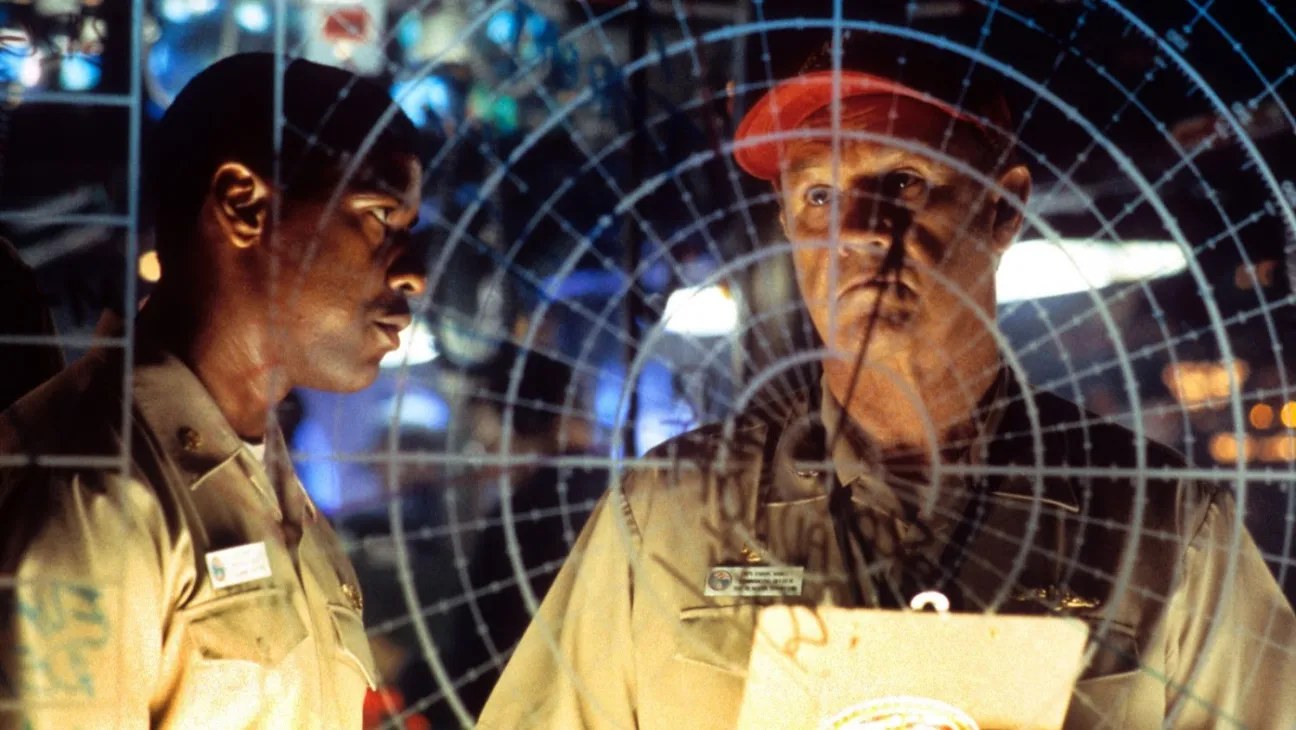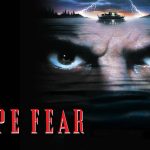“Crimson Tide”

“Crimson Tide,” directed by Tony Scott and released in 1995, is a gripping naval thriller that delves into the complex dynamics of military leadership and moral ambiguity. Set against the backdrop of a high-stakes submarine mission, the film explores themes of authority, duty, and ethical decision-making. With a powerful cast led by Denzel Washington and Gene Hackman, and a taut screenplay by Michael Schiffer, “Crimson Tide” offers a compelling examination of the tension between military protocol and individual conscience.
The film takes place aboard the USS Alabama, a nuclear-powered submarine equipped with ballistic missiles, during a time of international tension. The plot is set into motion when a coup in Russia threatens global stability, and the U.S. government prepares for a potential nuclear confrontation.
The story begins with Captain Frank Ramsey (Gene Hackman), a seasoned and authoritative leader, commanding the USS Alabama. Ramsey’s executive officer, Lieutenant Commander Ron Hunter (Denzel Washington), is a highly skilled officer with a more modern approach to naval tactics and military ethics.

The central conflict arises when the submarine receives a transmission indicating that Russia has lost control of its nuclear arsenal, and a follow-up message is intercepted suggesting that a nuclear launch might be imminent. The message is garbled, creating uncertainty about whether the threat is genuine. Ramsey believes that the situation warrants a preemptive strike to ensure national security, while Hunter argues that launching missiles based on an incomplete and unclear message would be reckless and could trigger an unnecessary global catastrophe.
As the tension mounts, the crew is divided between the two leaders, and the film explores the intense power struggle between Ramsey and Hunter. The situation escalates into a standoff, with the fate of the world hanging in the balance as the two leaders confront each other and wrestle with the moral implications of their decisions.
“Crimson Tide” delves into several profound themes through its narrative. One of the most prominent themes is the nature of leadership and authority. The film examines how different leadership styles can impact decision-making and the effectiveness of command. Captain Ramsey represents traditional authority, relying on his experience and decisiveness, while Lieutenant Commander Hunter embodies a more cautious and questioning approach.

The theme of moral ambiguity is central to the film’s plot. The uncertainty surrounding the intercepted message raises questions about the ethics of military action and the responsibility of leaders to act with both decisiveness and moral integrity. The film portrays the complexity of making life-and-death decisions in high-pressure situations, emphasizing that there are no easy answers when it comes to matters of national security and human lives.
Additionally, “Crimson Tide” explores the concept of duty and loyalty. The crew’s loyalty to their commanding officers and the ethical dilemmas they face are reflective of broader questions about duty to one’s country versus personal moral convictions. The film highlights the psychological and emotional strains experienced by military personnel when their beliefs and responsibilities are put to the test.
The performances by Denzel Washington and Gene Hackman are central to the film’s impact. Gene Hackman’s portrayal of Captain Frank Ramsey is authoritative and commanding, capturing the essence of a leader who is both respected and feared. Hackman’s performance adds depth to the character, showcasing Ramsey’s unwavering confidence and the complexities of his leadership style.
Denzel Washington’s portrayal of Lieutenant Commander Ron Hunter provides a compelling counterpoint to Hackman’s character. Washington’s performance is marked by a combination of intellect, integrity, and resolve. Hunter’s character is portrayed as principled and thoughtful, and Washington’s nuanced performance effectively conveys the internal and external conflicts faced by his character.
The supporting cast, including actors such as Viggo Mortensen, James Gandolfini, and Matt Craven, contributes to the film’s dynamic and realistic portrayal of life aboard a submarine. The interactions between the characters and the portrayal of the crew’s reactions to the unfolding crisis add authenticity and depth to the narrative.

Tony Scott’s direction is characterized by its intense and immersive style. The film’s cinematography effectively captures the claustrophobic environment of the submarine, creating a sense of confinement and tension that enhances the dramatic stakes. Scott’s use of close-ups and tight camera angles adds to the feeling of urgency and pressure experienced by the characters.
The film’s pacing is brisk and maintains a tight grip on the audience, with the suspenseful plot unfolding in real-time. Scott’s direction ensures that the tension between Ramsey and Hunter is palpable, and the film’s dramatic confrontations and high-stakes decisions are presented with intensity and clarity.
“Crimson Tide” has had a notable impact on the genre of naval and military thrillers. The film is recognized for its exploration of leadership and moral dilemmas, setting it apart from typical action-oriented military dramas. Its portrayal of the complexities of military command and ethical decision-making has been praised for its depth and realism.
The film’s success also reinforced the reputations of its lead actors, particularly Denzel Washington and Gene Hackman, as versatile and powerful performers. Their performances have been widely acclaimed and remain some of their most memorable roles.
In conclusion, “Crimson Tide” (1995) is a masterful naval thriller that combines intense drama with thought-provoking themes. The film’s exploration of leadership, moral ambiguity, and duty is delivered through a compelling narrative and powerful performances by Denzel Washington and Gene Hackman. Tony Scott’s direction and the film’s immersive visual style contribute to its effectiveness as a gripping and intellectually stimulating drama. “Crimson Tide” stands out as a significant entry in the genre, offering a nuanced examination of the complexities faced by military leaders and the ethical challenges of decision-making in times of crisis.










